- Home
- Nnedi Okorafor
Remote Control Page 2
Remote Control Read online
Page 2
She walked up the empty dirt road, now wearing a brand-new blue and white wrapper, matching top and headband, all made of soft, weather-treated BioSilk. She held her head up and looked into the night with the confidence of a leopard. Sankofa liked to imagine that she was a Mamprusi princess walking the moonlit road toward her long-lost queendom. If she had to guess, her mother would have been proud of the way she chose to carry herself … despite it all.
“I’m almost there, Mama,” she muttered, clenching her fists. A twinge of anxiety about the incident in the road days ago. Then the feeling was gone. Onward. It had been way too long.
She stopped, hearing footsteps behind her. She whirled around. It was the gateman from the house she’d just left. The one who had looked at her as if she were a smear of feces on some child’s underwear.
“Anyén!” he cried. He switched to English. “Evil witch!” He was sweating and weeping. “Kwaku Agya. Do you know this name? Do you remember my brother’s name? Does the child of the devil remember the names of those it kills?”
“I know the name,” she said. Sankofa remembered all the names of those she took as a kindness.
Surprise and then rage rippled across his face. He raised something black in his hand. Bang!
Time always slowed for her during these kinds of moments. The misty white smoke plumed from the gun’s muzzle. Then the bullet, this one golden, short and dented. It flew out of the gun’s muzzle followed by a larger plume of white smoke. The bullet rotated counter-clockwise as it traveled toward her. She watched this as the heat bloomed from her like a round mushroom. In times like this, it was near involuntary. From somewhere deep within her soul, a primal part of her gave permission to her unearthly power. That part of her had been on the earth, walking the soils of the lands now known as Ghana for millennia.
The night lit up.
The empty road.
The trees.
The houses and huts nearby.
The eyes of the silent witnesses.
The gnats, mosquitoes, flies, grasshoppers, beetles, some in flight, some not. The hiding, always observing spiders. The birds in the trees. The lizards on the walls. And the grasscutter crossing the road a few feet away. Movenpick the fox standing nearby, never far from Sankofa’s heels. Washed in light that did not come from the moon.
The corona of soft green light domed out from Sankofa. To her, it felt like the shiver of a fever. It left a coppery smell in her nose. The bullet exploded feet from her with a gentle pop! The molten pieces flew into the flesh of a palm tree beside the road.
Sankofa shined like a moon who knew it was a sun. The light came from her, from her skin. It poured from her, strong and controlled. It washed over everything, but it was only hungry for the man who’d shot at her. It hadn’t always been this way. In the past, her light’s appetite had been all-consuming.
The man stumbled back. The gun in his hand dropped to the ground. Then he dropped, too.
Sankofa walked up to him, still glowing strongly. She knelt down, looking into the gateman’s dying eyes. She spoke to the man in his native language of Twi, “Your brother’s name was Kwaku Samuel Agya and his cancer was so advanced that it had eaten away most of his internal organs. I did not cause this cancer, gateman. I happened to walk into his village when he was ready to die. He asked me to take him. His wife asked me to take him. His son asked me to take him. His best friend asked me to take him.” Tears fell from her eyes as she spoke. Then she pushed away the pain in her chest. She muted it as she’d learned to do over the years. Her tears dried into trails of salt as her skin heated. She stood up. “When was the last time you spoke to your brother, gateman?”
His skin crackled and peeled as it burned orange. It blackened, flaking off into dust. His entrails spilled out in a hot steaming mass when his skin and abdominal flesh burned away. Then that burned, too. The muscle and fat from his limbs flared up and then fell to ash, as well. There was little smoke but the air began to smell like burning meat. A mysterious wind came and swept away the ash and soon all that was left was one bone.
“I will never know or understand what that is,” she whispered. “But at least it’s clean.”
The bone dried, its surface snapped in several places, splintered and then cooled. Someone would find it.
“Now you will talk to your brother,” Sankofa said. She turned away, opened her bag and brought out the jar of thick yellow shea butter. She scooped out a dollop. She rubbed it in her hands until it softened then melted. Then she rubbed it on her arms, legs, neck, face and belly. She sighed as her dry skin absorbed the natural moisturizer. She glanced at Movenpick who stood in the bushes to her right. The fox walked up the road, leading the way. Sankofa followed the fox into the night as if she were her own moon.
CHAPTER 2
STARWRITER
For the first five years of her life, Fatima was a sickly child. Mosquitoes adored her blood and so she had malaria every few months. But she still found ways to be happy. When she was well and old enough to crawl into the open area in back of the house, Fatima discovered dirt. She would sit beneath the large shea tree that grew closest to her family’s small house and revel in the earthy smell of the dirt. She’d sift it between her fingers when it was dry and mold and squeeze it when it was moist. She especially loved to draw in it and the bigger her drawing, the more delighted she was with the dirt.
One evening, Fatima was outside with her grandfather. She’d been carving one of her giant circles in the mud around the shea tree. She sat back, satisfied, and looked up at the darkening sky. And that was when she discovered the stars. They were twinkling and blinking and shining like insects and tiny fish all in the same space. Her grandfather had always been a star gazer and her intense interest in the stars delighted him. He’d taught her all she knew, coming over more often to spend time with her in the evening and show the little girl that space was amazing. Before long, she’d learned the location and names of the constellations, though she sometimes preferred to name the stars herself. Jupiter, Mars, Venus and Milky Way were nice names, but “white spark,” “palm kernel,” “owusu” and “spiderweb” were better.
Her grandfather started calling her Starwriter because she claimed that though she couldn’t read them, she could see and even write words she saw in the sky. But the name never stuck and Fatima remained Fatima and the name Starwriter was quickly forgotten. Still, she wrote what she saw in the sky on those evenings with her grandfather and those led to the most intricate designs a four-year-old could ever draw. They were the size of the entire yard, wider than the shea tree’s circumference. Loops, spirals, branching designs, giant circles and sharp deep lines. Fatima was enjoying herself.
It was strange but it kept her occupied, quiet and exercised, so her parents didn’t mind. At some point, she started climbing that shea tree to get a better look at her “sky words.” She’d stay up there, marveling at what she’d made. Even when she wasn’t feeling so well, she could usually be found amongst the tree’s branches, gazing down at her work.
Then came that day, the day she unknowingly stepped onto the path to becoming the infamous Sankofa. She’d drawn one of her “sky words” in the large area of dirt beside the tree and then climbed up to look down at it. The constellation that her grandfather called Sagittarius had guided her hand. But tonight, a playfulness had made her see it differently. Like new. Writing it upside down, it made more sense. And then she’d added the flourish from the part of the constellation that had never been there until tonight. She giggled, delighted by her work. The sky words looked like a Sankofa bird! She looked back into the sky to make sure she’d gotten the design right. And that’s when she saw what her brother Fenuku later called a “meaty shower.”
A minute later, Fenuku dashed out the back door and Fatima saw him gather with his friends nearby to watch it. She’d climbed higher in her tree for a better look. Even her parents came outside to watch. The whole village would talk about it for weeks because not only were
there beautiful green streaks decorating the sky, but one could actually hear the “shower” hitting the shea tree leaves like rain. One had even zipped down and hit the dirt at the base of the tree, right at the end of the swirl of one of her sky words.
Fatima climbed down to see if she could find it. There it was, like a tiny Sankofa bird egg or … seed. It glowed a bright green like a star. She paused for a moment, wondering about the “sky words,” then she giggled, rushed forth and grabbed it. It wasn’t hot to the touch, but as she’d held it to her eyes, she could see that its light was seeping from it like oil. She cupped it in her hands and the light pooled in her palm and seemed to absorb into her skin. It burned and she hissed. Maybe it was hot. She dropped the thing and it sank right into the soil, like a stone into water. She got to her knees, saying, “No no no, come back! I’m sorry! Come back, little seed!” But it was gone.
Fatima never told her parents or her brother because she was sure none of them would believe her. About a year later, maybe even exactly a year, that afternoon, when she was five years old, bothered with malaria-caused fever and aching muscles, she’d still managed to climb into the tree and sit on one of the top branches. It had been a while since she’d drawn “sky words.” Her grandfather had passed away months ago and she no longer looked at the sky so much, and so she no longer drew what she saw. Now she spent her time playing with her dolls in the tree or just hanging from its branches.
She rested her head against the tree’s trunk and shut her eyes. She loved this tree so much and every so often, it seemed to love her back, too, its leaves looking greener in the sunshine than any other tree. A cool breeze blew and being up here, she felt it directly. She was supposed to be in bed, but her mother was talking to her best friend, Auntie Karimu, on the other side of the house and Fatima had taken her chance.
She’d giggled because on the other side of the tree, she saw the red-furred animal curiously looking at her as it rested on a thick branch. The fox who’d escaped from the zoo two weeks ago and had in the last few days decided to make this tree its home. He was another reason she spent time in the tree. She’d been sitting between her mother’s knees having her hair braided when the brief news story played on her mother’s tablet. She and her mother had giggled about it because the news story had described foxes as crafty. “They’ll never find that thing,” her mother had said.
The breeze blew harder, rustling the fox’s fluffy coat and feeling wonderful on her hot sweaty skin. Something below caught her eye. When she saw the soil churning, Fatima wondered if she was having one of the visions she often had when her malaria fever got high. Her furry friend on the branch across from her whined and moved further up the tree. Fatima, however, climbed down to investigate.
Maybe it’s a mole, she thought. Or a spider. She hoped it was a spider; she liked spiders. Whatever it was, if it was coming up at the base of the tree, it had to be something good, for this was where the seed from the sky had fallen. Because of the seed from the sky nothing bad or scary could ever come close to this tree, at least that was how Fatima understood it. Even her father knew this tree was a good good tree; sometimes he even laid his prayer mat right on the spot where the thing was ascending.
What she immediately noticed as her bare feet touched the ground was the smell. Her parents had been traders until they acquired a small shea farm years before she was born. Today, their small farm extended a quarter of a mile from the house and Fatima was quite familiar with the tree’s fresh scent, but this one always had a stronger nuttier aroma than the others. And now it smelled as if a whole truckload of sliced shea fruit had been dumped at her feet. Even in the strong breeze, it was powerful and heavy.
She wiped sweat from her brow as she stared down. The red soil was churning as if small hands beneath it were stirring and kneading the earth. The soil sank down and a hole about the size of both of Sankofa’s five-year-old hands appeared. Then something flat and brown was pushing through it. She stood there fascinated. A wooden box. About six inches long and four inches wide and two inches deep. There was no latch, no lock, and it was a rich brown like the tree’s trunk, though the wood was smooth, not the spongy rough of the shea tree.
“Oh!” Fatima whispered as she bent down to pick it up. “Is it for me?” Of course it was. She claimed it immediately, or maybe it claimed her. It was something valuable, or maybe it saw the value in her. It was beloved like something she’d lost a long time ago and just found, or maybe it had found her. It was like something she would own in a future life. Yes, oh yes, it was definitely hers.
She picked up her box. It was surprisingly heavy and she had to cradle it to her chest. She froze, staring at the hole. The box had been resting on a tannish-white root about as thick as three of her fingers put together. “Thank you,” she said to it.
She sat down. Then she pushed up the box’s thick lid. A hearty scent of crushed leaves rushed out and her eyes began to water at the sight of what was inside. Oblong in shape, it was just a little larger than her father’s big toe and it had a smooth almost tooth-like surface. It was no longer leaking the glowing green light, but it was definitely the seed that had fallen from the sky and sunken into the dirt. “You’ve come back to me!” she said to the seed. And as if it had been waiting for these words, the root that had presented it glided back into the soil.
When she picked the seed up, her fingers went numb and she felt a warmth spread all over the rest of her body. She held it to her eyes as a green mist like incense smoke wafted from it. She laughed, blowing at and sniffing the mist; it too was warm. When she opened her mouth, she found she exhaled the green mist a bit, too. After a minute, the mist disappeared and the smell went away. Fatima giggled, cupping the seed in her hands, imagining it to be delicate and alive like a baby mouse.
“Hello,” she whispered to it. “I’m Fatima. Maybe you like the heat from my hands. I have a fever from malaria, so I’m not feeling very well.” She set the seed back in the box and shook out her hand until the feeling returned. Then she shut the box and got up. She used her sandal to push soil over the hole the root had left and took the box and its seed inside. By the time she stepped into her bedroom, her fever was gone. She simply didn’t feel it anymore. The next day, even her parents were sure that her bout with malaria had passed.
As the days rolled on, her parents and brother came to know of the wooden box she liked to keep in her room. Her father would joke about the box with his friends, saying his imaginative daughter said the tree gave it to her. Her mother would talk about it at the market, saying her daughter treated everything like a person, even things she dug up from the ground. Her brother only rolled his eyes when he saw his sister playing with it. Fatima told the seed stories, she climbed into the tree with it, she snuck it to school in her pocket. “It doesn’t have a face or a name,” her mother had jokingly said one evening as she tucked Fatima into bed. “What is it with you and that old thing?”
“It’s my thing,” Fatima said importantly. “A nice thing that listens.”
Nevertheless, though she didn’t know it then, finding that seed in the box was the beginning of so much. She loved her favorite tree, shared its space with a fox who didn’t belong in Ghana, and because her bouts with malaria had passed, she was a happier child. No matter how late she stayed in that tree, mosquitoes no longer bit her. She was well enough to make friends and go with them to watch her older brother Fenuku play football on the nearby field. Life was nice and fun and happy for Fatima that year.
Her parents didn’t ask where she’d gotten the seed in the box. To them, it was just a thing. Maybe it was just a petrified palm tree seed she’d found somewhere in the shea tree farm and polished up. Maybe a teacher at her school or someone in the market dropped the box. Maybe it was an old jewelry box; her parents had lived in their small house since before both Fatima and her brother’s births and there were certainly many forgotten random things in that house. It was all possible and normal. Her brother wasn’t interes
ted in the seed either. It was a thing that you didn’t plug in, a thing that couldn’t connect to the internet. To him it was a boring thing.
* * *
Almost a year to the day later, Fatima was in the tree brooding. She’d had an argument with her brother over a chocolate bar their father had told them to share. Her brother had snatched it and run off and just then, the politician had arrived and her parents were in no mood to hear her pleas for justice.
She climbed to the highest part of the tree, which was pretty high because she was so small and light. And from here, she could see over the house and thus had a good view of the strangers who’d come to the house. She wiped away the frustrated tears in her eyes as she stared. There was a black SUV, parked in front of the house. She squinted. Two men were talking to her parents, a man wearing a white kaftan and pants and a heavy-set man dressed in a European suit. She immediately recognized the suit and gasped with delight. “How can this be!” she exclaimed.
She’d seen him on the jelli telli in the Village Square when the men gathered to discuss politics and current affairs. This was a politician known for shouting and wearing gold shoes. Her father found this man incredibly annoying. Fatima loved when he came on TV because the way her father talked about him made her and everyone in the room laugh. She squinted and sure enough, his shoes glinted so brightly, they looked made of sunshine. She giggled. Her brother would be so jealous when she told him what she saw.
Suddenly, the man in the white kaftan turned and seemed to look right at her. Fatima ducked down behind a branch, a shiver running up her spine. They all went inside and Fatima waited there for a few minutes wondering if she should climb down and hide amongst the shea trees in the farm behind the house.

 Binti, The Complete Trilogy: Binti ; Home ; The Night Masquerade
Binti, The Complete Trilogy: Binti ; Home ; The Night Masquerade Remote Control
Remote Control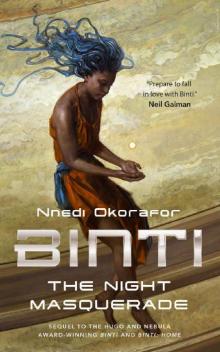 Binti: The Night Masquerade
Binti: The Night Masquerade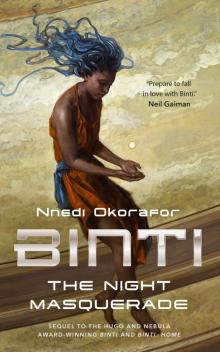 Binti--The Night Masquerade
Binti--The Night Masquerade Kabu Kabu
Kabu Kabu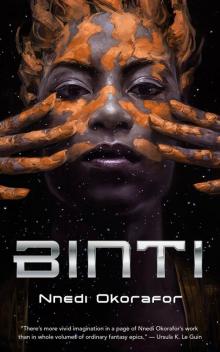 Binti
Binti Zahrah the Windseeker
Zahrah the Windseeker Akata Witch: A Novel
Akata Witch: A Novel Ikenga
Ikenga Who Fears Death
Who Fears Death Binti--Home
Binti--Home Lagoon
Lagoon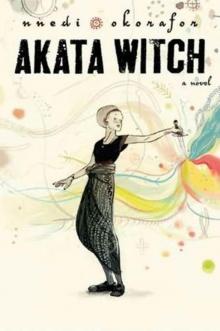 Akata Witch
Akata Witch The Book of Phoenix
The Book of Phoenix Akata Warrior
Akata Warrior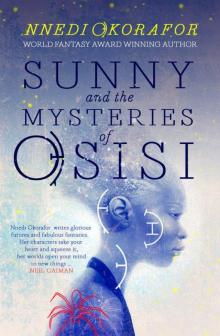 Sunny and the Mysteries of Osisi
Sunny and the Mysteries of Osisi